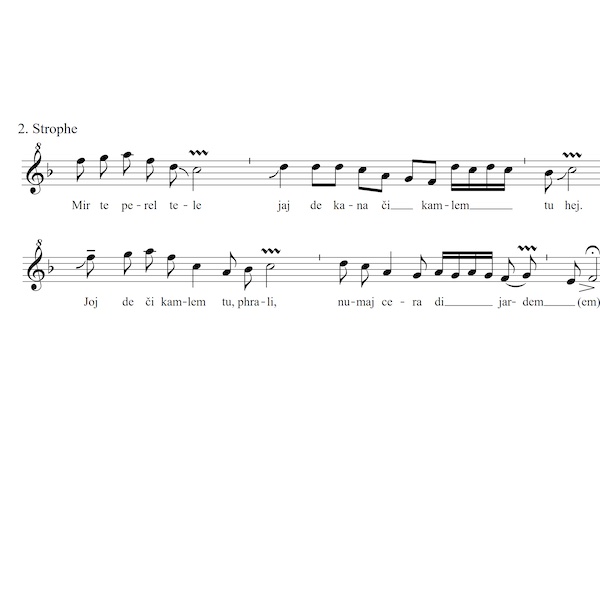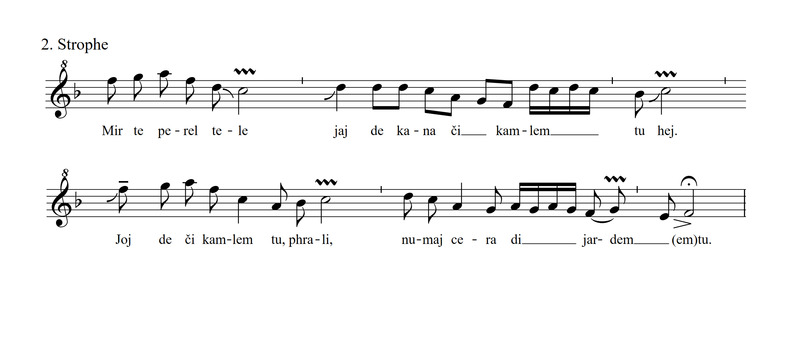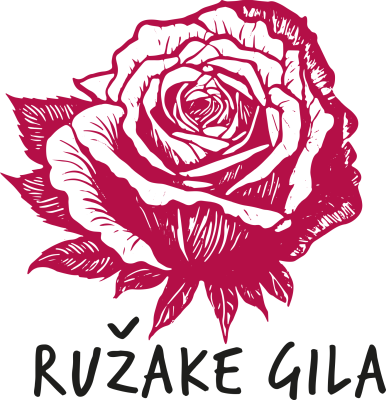
Perel tele, šeje, tji panruni coxa
Content
Recordings
Perel tele, šeje, tji panruni coxa is a slow song that deals with the relationship between a man and a woman. According to the singer, it is a very old song. The recording was made in 1992 at the Nikolić family home during a field research interview. Mišo Nikolić is still a bit unsure about the guitar accompaniment. This may also be because the melody deviates somewhat from typical slow songs.
musical transcription
For Ruža, this is a special song within loke gila. This is due to the close connection to her family. She associates it with her sister who died at a young age and from whom she had learned the song. Her father also used to whistle it whenever he was sad. Although it may not be widespread, the song has accompanied the singer throughout her life, as she has already been singing it at the age of 15.
Ruža Nikolić-Lakatos sings Perel tele, šeje, tji panruni coxa. The recording was made in 1960 by Mozes F. Heinschink. It is one of the singer’s earliest recordings. She was only 15 years old at the time. The singer begins with improvised syllables and continues to use them throughout. The audio is a combination of two different recordings.
Commentary
(GERMAN ONLY) Ruža Nikolić-Lakatos and Mišo Nikolić explain the context and meaning of Perel tele, šeje, tji panruni coxa to ethnomusicologist Ursula Hemetek. Ruža explains that it is the song of her sister Agnes who passed away at a young age. Her father often whistled it when he was sad. The couple also refers to the meaning of the song. The recording is from a field research interview at the Nikolić family home in 1992.
Lyrics
Stanza 1
| Jaj de perel tele, šeje, | Your silk dress, girl, |
| tji panruni coxa, de jaj. | should fall. |
| Jaj de pala kodo, čori, | And after that, girl, |
| tji loli de le papuča. | your red shoe. |
Stanza 2
| Mir te perel tele, | Why should I take them off, |
| jaj de kana či kamlem tu hej. | I did not love you! |
| Joj de či kamlem tu, phrali, | I did not love you, lad, |
| numaj cera dijardem tu. | I just played with you a little. |
Stanza 3
| Apal phendas: | Then she said: |
| Dijardem tu, phrali, | I played with you, boy, |
| joj de anda tjire love hej, | because of your money, |
| joj de anda tjire love, | because of your money, |
| anda tjire kale jakha. | because of your dark eyes. |
Stanza 4
| Joj de kaske rodes, šeje, | For whom are you earning, girl, |
| zeleni šelengi hej? | green hundreds? |
| Joj de rodav le, rodav le, | I earn them, I earn them, |
| Devlam, taj či žanav kaske. | my God, I don’t know for whom. |
Stanza 5
| Jaj de voja, bukurija | Joy and pleasure |
| kerel šel ezera hej, | are worth a hundred thousand, |
| jaj de kerel šel ezera | are worth a hundred thousand, |
| mamo, ando taršošago. | mother, in company. |
Stanza 6
| De ma Devla, de ma, | Give me, God, give me, |
| jaj de so me tutar mangav hej! | what I ask of you! |
| Joj de či mangav rajimo, | I’m not asking for wealth, |
| de man, Devlam, tjo sastimo. | just give me, my God, your health. |
| Sa tja patjivake, Uschi! | All in your honour, Uschi! |
Zitierempfehlung anzeigen
Bitte zitieren Sie diese Seite wie folgt:
Music and Minorities Research Center, "Perel tele, šeje, tji panruni coxa", Ružake gila, zuletzt besucht am Loading date..., doi.org/10.21939/wez8-m606


